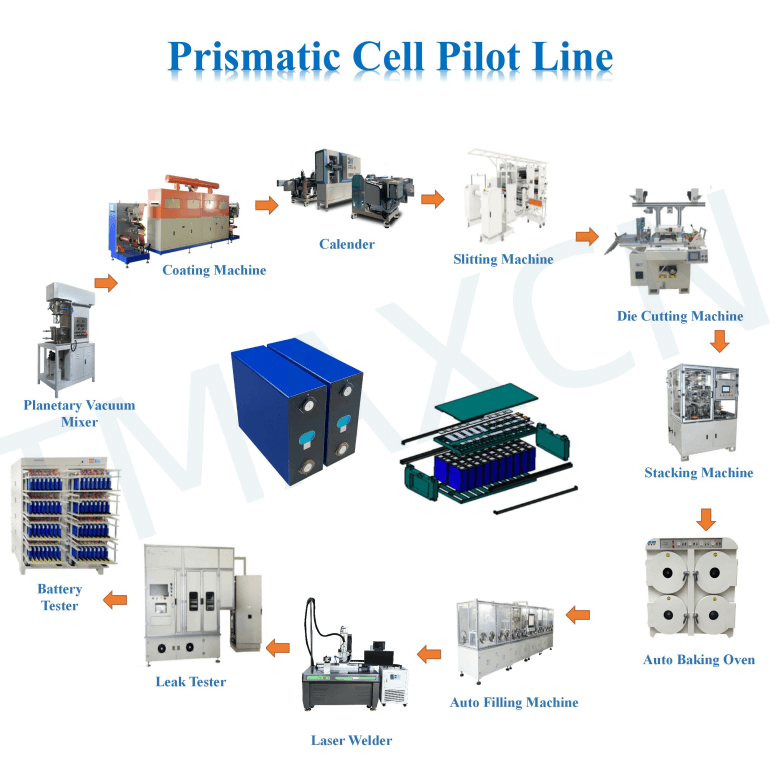Site Blog
Ligne de machines de fabrication de production de cellules cylindriques automatiques
fabrication et équipement de laboratoire de batterie de Li-ion 18650
Organigramme de la pile bouton au lithium-ion et liste des machines
fabrication et équipement de laboratoire de batterie de poche de li-ion
dec 2016 usa client acceptation d'usine de l'empileuse automatique
Contactez-nous
- Si vous avez des questions, veuillez communiquer avec nous, toutes les questions recevront une réponse
- Messagerie : David@tmaxcn.com
- Messagerie : Davidtmaxcn@gmail.com
- Ajouter : No. 39, Xinchang Road, Xinyang, Haicang Dist., Xiamen, Fujian, China (Mainland)
produits chauds
Car lithium battery production line are increasingly shifting towards flexible assembly lines in tandem with the broader trends in the automotive industry. This transition is driven by several factors that aim to enhance efficiency, accommodate diverse vehicle models, and adapt to the evolving landscape of electric vehicles (EVs). Here are key aspects of how car battery production lines are moving towards flexible assembly:
Diverse Vehicle Models:
The automotive industry is witnessing a surge in the variety of electric vehicles, ranging from compact city cars to larger SUVs. To accommodate this diversity, car battery production lines are becoming more flexible, allowing for seamless integration with different vehicle models. This flexibility is essential to meet consumer demands for a wide array of electric vehicles with varying features and specifications.
Modularity and Scalability:
Flexible Car lithium battery manufacturing line are characterized by modularity and scalability. Car battery production lines are designed with interchangeable modules that can be easily adapted or expanded. This modular approach allows manufacturers to scale production based on market demand and to integrate new technologies or improvements without disrupting the entire assembly process.
Customization and Personalization:
Consumers are increasingly seeking customization and personalization options for their electric vehicles. Flexible assembly lines enable manufacturers to incorporate bespoke features or configurations efficiently. This is particularly relevant for electric vehicles, where battery sizes, capacities, and performance characteristics can vary significantly.
Rapid Technological Advancements:
The field of electric vehicle technology is evolving rapidly. New battery chemistries, energy storage solutions, and integration with advanced driver-assistance systems (ADAS) require a nimble production environment. Flexible assembly lines can more readily accommodate changes in technology and facilitate the integration of the latest advancements.
Reduced Changeover Times:
Flexible Car lithium battery pilot line are designed to minimize changeover times between different production setups. This is crucial for car battery production lines, especially as the demand for various electric vehicle models fluctuates. Quick changeovers enhance operational efficiency and reduce downtime during transitions between different assembly configurations.
Adaptability to Industry 4.0:
The adoption of Industry 4.0 principles, including automation, data exchange, and real-time analytics, is a key aspect of modern manufacturing. Flexible assembly lines in car battery production embrace these principles, allowing for the integration of smart technologies and data-driven decision-making processes. This contributes to improved quality control, predictive maintenance, and overall operational excellence.
Supply Chain Resilience:
Flexible assembly lines contribute to supply chain resilience by providing manufacturers with the ability to adapt quickly to changes in the availability of materials and components. This adaptability is essential for mitigating disruptions, such as those caused by global events or supply chain challenges.
Environmental Considerations:
The shift towards electric vehicles is accompanied by a growing emphasis on sustainability. Flexible assembly lines can be optimized to reduce waste, energy consumption, and environmental impact. This aligns with the broader industry goal of creating more sustainable and eco-friendly manufacturing processes.
In summary, the move towards flexible assembly lines in car battery production reflects the dynamic nature of the electric vehicle market. This shift enables manufacturers to stay agile, respond to market demands, and integrate the latest technologies, ultimately contributing to a more resilient and efficient automotive manufacturing ecosystem.
 English▼
English▼





 +86 13174506016
+86 13174506016 David@tmaxcn.com
David@tmaxcn.com

